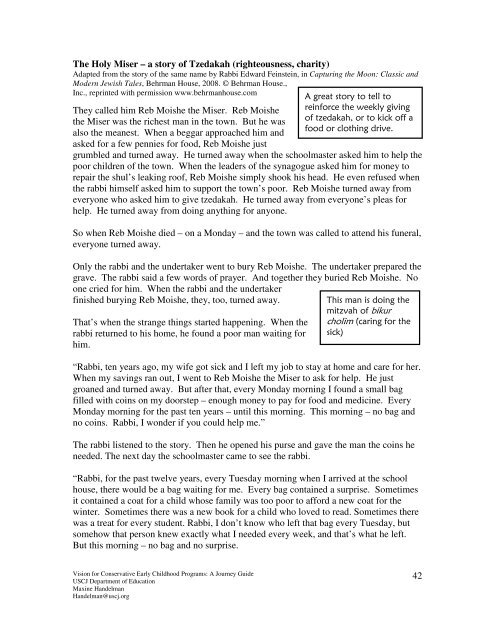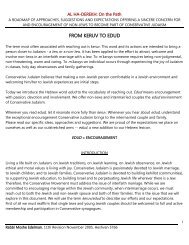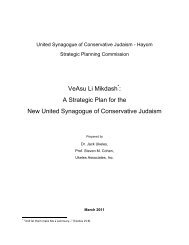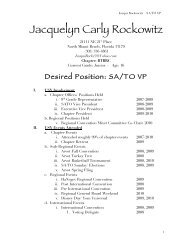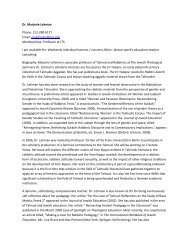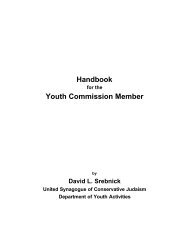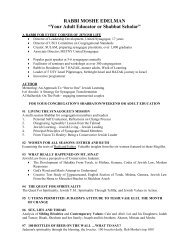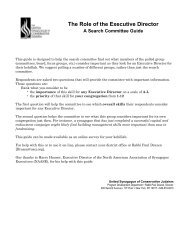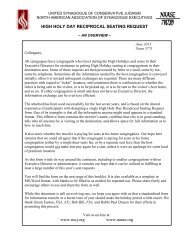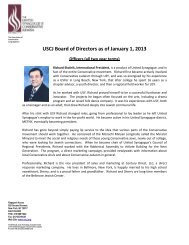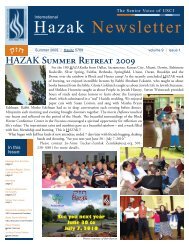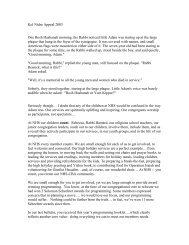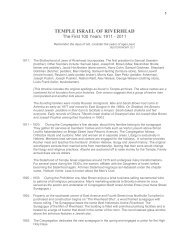Vision for Conservative Early Childhood Programs: A Journey Guide
Vision for Conservative Early Childhood Programs: A Journey Guide
Vision for Conservative Early Childhood Programs: A Journey Guide
Create successful ePaper yourself
Turn your PDF publications into a flip-book with our unique Google optimized e-Paper software.
The Holy Miser – a story of Tzedakah (righteousness, charity)<br />
Adapted from the story of the same name by Rabbi Edward Feinstein, in Capturing the Moon: Classic and<br />
Modern Jewish Tales, Behrman House, 2008. © Behrman House.,<br />
Inc., reprinted with permission www.behrmanhouse.com<br />
They called him Reb Moishe the Miser. Reb Moishe<br />
the Miser was the richest man in the town. But he was<br />
also the meanest. When a beggar approached him and<br />
asked <strong>for</strong> a few pennies <strong>for</strong> food, Reb Moishe just<br />
<br />
!' %<br />
.%)%!%<br />
!2<br />
<br />
grumbled and turned away. He turned away when the schoolmaster asked him to help the<br />
poor children of the town. When the leaders of the synagogue asked him <strong>for</strong> money to<br />
repair the shul’s leaking roof, Reb Moishe simply shook his head. He even refused when<br />
the rabbi himself asked him to support the town’s poor. Reb Moishe turned away from<br />
everyone who asked him to give tzedakah. He turned away from everyone’s pleas <strong>for</strong><br />
help. He turned away from doing anything <strong>for</strong> anyone.<br />
So when Reb Moishe died – on a Monday – and the town was called to attend his funeral,<br />
everyone turned away.<br />
Only the rabbi and the undertaker went to bury Reb Moishe. The undertaker prepared the<br />
grave. The rabbi said a few words of prayer. And together they buried Reb Moishe. No<br />
one cried <strong>for</strong> him. When the rabbi and the undertaker<br />
finished burying Reb Moishe, they, too, turned away.<br />
That’s when the strange things started happening. When the<br />
rabbi returned to his home, he found a poor man waiting <strong>for</strong><br />
him.<br />
<br />
.&%<br />
!/!<br />
!%1<br />
“Rabbi, ten years ago, my wife got sick and I left my job to stay at home and care <strong>for</strong> her.<br />
When my savings ran out, I went to Reb Moishe the Miser to ask <strong>for</strong> help. He just<br />
groaned and turned away. But after that, every Monday morning I found a small bag<br />
filled with coins on my doorstep – enough money to pay <strong>for</strong> food and medicine. Every<br />
Monday morning <strong>for</strong> the past ten years – until this morning. This morning – no bag and<br />
no coins. Rabbi, I wonder if you could help me.”<br />
The rabbi listened to the story. Then he opened his purse and gave the man the coins he<br />
needed. The next day the schoolmaster came to see the rabbi.<br />
“Rabbi, <strong>for</strong> the past twelve years, every Tuesday morning when I arrived at the school<br />
house, there would be a bag waiting <strong>for</strong> me. Every bag contained a surprise. Sometimes<br />
it contained a coat <strong>for</strong> a child whose family was too poor to af<strong>for</strong>d a new coat <strong>for</strong> the<br />
winter. Sometimes there was a new book <strong>for</strong> a child who loved to read. Sometimes there<br />
was a treat <strong>for</strong> every student. Rabbi, I don’t know who left that bag every Tuesday, but<br />
somehow that person knew exactly what I needed every week, and that’s what he left.<br />
But this morning – no bag and no surprise.<br />
<strong>Vision</strong> <strong>for</strong> <strong>Conservative</strong> <strong>Early</strong> <strong>Childhood</strong> <strong>Programs</strong>: A <strong>Journey</strong> <strong>Guide</strong><br />
USCJ Department of Education<br />
Maxine Handelman<br />
Handelman@uscj.org<br />
42


